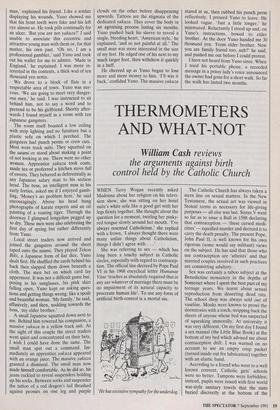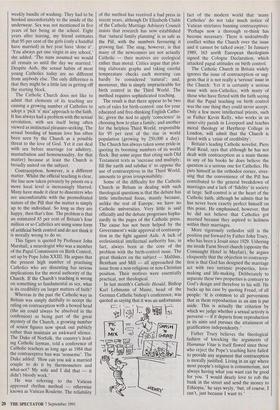THERMOMETERS AND WHAT-NOT
William Cash reviews
the arguments against birth control held by the Catholic Church
WHEN Terry Wogan recently asked Madonna about her religion on his televi- sion show, she was sitting on her hotel suite's white sofa like a good girl with her legs firmly together. She thought about the question for a moment, twirling her pinky- red tongue slowly around her mouth. 'I've always resented Catholicism,' she replied with a frown, 'I always thought there were many unfair things about Catholicism, things I didn't agree with. .
She was referring to sex — which has long been a touchy subject in Catholic circles, especially with regard to contracep- tion. The official line decreed by Pope Paul VI in his 1968 encyclical letter Humanae Vitae 'teaches as absolutely required that in any use whatever of marriage there must be no impairment of its natural capacity to procreate human life'. To use any form of artificial birth-control is a mortal sin.
'He has excessive sympathy for the underdog.' The Catholic Church has always taken a stem line on sexual matters. In the New Testament, the sexual act was viewed in Stoical terms as necessary for life-giving purposes — all else was lust. Sixtus V went so far as to issue a Bull in 1588 declaring that contraception — 'these cursed medi- cines' — equalled murder and decreed it to carry the death penalty. The present Pope, John Paul II, is well known for his own rigorous (some would say militant) views on the subject. He has said that those who use contraception are 'atheists' and that married couples involved in such practices are committing adultery.
Sex was certainly a taboo subject at the BenedictMe monastery in the depths of Somerset where I spent the best part of my teenage years. We learnt about sexual reproduction from dissecting dead rats. The school shop was always sold out of vaseline. Monks were known to prowl the dormitories with a torch, stripping back the sheets of anyone whose bed was suspected of squeaking immorally. At university it was very different. On my first day I found a sex manual (the Little Blue Book) at the bottom of my bed which advised me about contraception drill: I was warned on no account to use an empty crisp packet (turned inside out for lubrication) together with an elastic band.
According to a friend who went to a well known convent, Catholic girls' schools were no better. Tampons were forbidden; instead, pupils were issued with first world war-style sanitary towels that the nuns buried discreetly at the bottom of the weekly bundle of washing. They had to be hooked uncomfortably to the inside of the underwear. Sex was not mentioned in five years of her being at the school. Eight years after leaving, my friend estimates that 95 per cent of the girls (only a handful have married) in her year have 'done it'. 'You always get one virgin in any school,' she added. The nuns assumed we would all remain so until the day we married.' Despite Aids, the sexual habits of most young Catholics today are no different from anybody else. The only difference is that they might be a little late in getting off the starting block.
The Catholic Church does not like to admit that elements of its teaching are causing a growing number of Catholics to adopt a 'pick 'n' mix' approach to the faith. It has always had a problem with the sexual revolution, with sex itself being often viewed as instinctual pleasure-seeking. The sexual bonding of human love has often been seen by the Church as a possible threat to the love of God. Yet it can deal with sex before marriage (or adultery, masturbation and homosexuality, for that matter) because at least the Church is broadly united on the subject.
Contraception, however, is a different matter. Whilst the official teaching is clear, the line now taken privately by priests on a • more local level is increasingly blurred. Many have made it clear to dissenters who are uncomfortable with the premeditated nature of the Pill that the matter is simply up to the individual. So long as they are happy, then that's fine. The problem is that an estimated 85 per cent of Britain's four million or so Catholics are using some form of artificial birth control and do not think it is morally wrong to do so.
This figure is quoted by Professor John Marshall, a neurologist who was a member of the Papal Commission on Birth Control, set up by Pope John ?CXIII. He argues that the present high number of practising Catholics who are dissenting has serious implications for the moral authority of the Church. If the Church's teaching is wrong on something so fundamental as sex, what is its credibility on larger matters of faith?
Whereas in the past the Catholic way in Britain was simply dutifully to accept the ruling on contraception with a bowed head (the sin could always be absolved in the confession) as being part of the great mystery of the Church, a growing number of senior figures now speak out publicly rather than maintain an awkward silence. The Duke of Norfolk, the country's lead- ing Catholic layman, told a conference of Catholic teachers as long ago as 1984 that the contraceptive ban was 'nonsense'. The Duke added: 'How can you ask a married couple to do it by thermometers and what-not? My wife and I did that — it didn't bloody work.'
He was referring to the Vatican approved rhythm method — otherwise known as Vatican Roulette. The reliability of the method has received a bad press in recent years, although Dr Elizabeth Clubb of the Catholic Marriage Advisory Council insists that research has now established that 'natural family planning' is as safe as the Pill, with the numbers favouring it growing fast. The snag, however, is that many of the newcomers are not actually Catholic — their motives are ecological rather than moral. Critics argue that plot- ting elaborate graphs and taking careful temperature checks each morning can hardly be considered `natural'; and, moreover, this is simply impracticable for birth control in the Third World. The method requires sophisticated teaching.
The result is that there appear to be two sets of rules for birth-control: one for your educated and free-thinking English Catho- lic, given the nod to apply 'conscience' in choosing how to plan a family; and another for the helpless Third World, responsible for 95 per cent of the rise in world population (growing by 250,000 a day). The Church has always taken some pride in quoting its booming numbers of its world flock. But some argue that citing such Old Testament texts as 'increase and multiply; fill the earth and subdue it' to oppose the use of contraceptives in the Third World, amounts to gross irresponsibility. Some of the difficulty for the Catholic Church in Britain in dealing with such theological questions is that the debate has little intellectual focus, mainly because, unlike the rest of Europe, we have no Catholic universities. Very little is said officially and the debate progresses hapha- zardly in the pages of the Catholic press. The cause has not been helped by the Government's wide approval of contracep- tion in the fight against Aids. A lack of ecclesiastical intellectual authority has, in fact, always been at the core of the problem with the birth-control issue. The great thinkers on the subject — Malthus, Bentham and Mill — all approached the issue from a non-religious or non-Christian position. Their motives were essentially practical, not theological. In last month's Catholic Herald, Bishop Karl Lehmann of Mainz, head of the German Catholic bishop's conference, was quoted as saying that it was an unfortunate fact of the modern world that 'many Catholics' do not take much notice of Vatican strictures banning contraceptives: 'Perhaps now a thorough re-think has become necessary. There is undoubtedly conflict within the Church over the issue and it cannot be talked away.' In January 1989, 163 north European theologians signed the Cologne Declaration, which attacked papal attitudes on birth control.
The Catholic Church in Britain widely ignores the issue of contraception or sug- gests that it is not really a 'serious' issue in the Church. Yet it is certainly a serious issue with non-Catholics, with many of those who have flirted with the faith saying that the Papal teaching on birth control was the one thing they could never accept. Only a few more intellectual priests, such as Father Kevin Kelly, who works in an inner-city parish in Liverpool and teaches moral theology at Heythrop College in London, will admit that the Church is faced with a 'crisis of credibility'.
Britain's leading Catholic novelist, Piers Paul Read, says that although he has not dealt with contraception as a main theme in any of his books he does believe the question is a serious one for Catholics. He puts himself in the orthodox corner, stres- sing that the convenience of the Pill has contributed to the general breakdown of marriages and a lack of 'fidelity' in society at large. Self-control is at the heart of the Catholic faith, although he admits that he has never been exactly perfect himself on this point. He emphasised, however, that he did not believe that Catholics got married because they aspired to holiness within their marriages.
More rigorously orthodox still is the position put forward by Father John Tracy, who has been a Jesuit since 1929. Ushering me inside Farm Street church (opposite the Connaught Hotel in Mayfair), he argues eloquently that the objection to contracep- tion is that God has designed the marriage act with two intrinsic properties, love- making and life-making. Deliberately to separate these two properties is contrary to God's design and therefore to his will. He backs up his case by quoting Freud, of all people: 'It is common to all perversions that in them reproduction as an aim is put aside. This is actually the criterion by which we judge whether a sexual activity is perverse — if it departs from reproduction in its aims and pursues the attainment of gratification independently.'
Father Tracy believes the theological fashion of knocking the arguments of Humanae Vitae is itself flawed since those who reject the Pope's teaching have failed to provide any argument that contraception is morally justified. Living in an age where most people's religion is consumerism, not always having what you want can be good for you. 'I would dearly love to rob the bank in the street and send the money to Ethiopia,' he says wryly, 'but, of course, I can't, just because I want to.'



















































 Previous page
Previous page